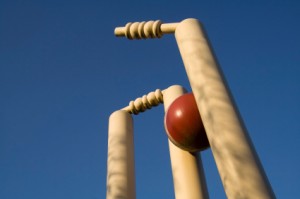Advertising and Sport – the real value of sponsorship and branding
Posted by Dr John Jewell

On Tuesday July 9th Nick Evershed wrote in the Guardian:
After watching the Qantas Wallabies play the Lions at ANZ Stadium on Saturday night, I caught up with the Bulldogs and Knights game on Sunday. During the match at Virgin Australia Stadium, a contentious try was reviewed by the video referee and announced on the KFC decision screen. I then watched the try replayed on the Great Wall video replay.
Evershed went on:
Have you noticed? There are five brand names in this paragraph.
I would hazard a guess that sponsorship and advertising around sports events is higher than it’s ever been. It’s worth big money: a report out in June 2013 found sport sponsorship in Australia is worth around US$735m per year.
This should not surprise anyone, really. Professional sport is about generating wealth and like it or not it is commercial advertising which powers modern sport. Let’s consider the 2013 Ashes series which has recently got underway.
Investec are the principal sponsors of the series. They are ‘specialist bankers’ described on their website as ‘providing a diverse range of financial products and services to a niche client base in three principal markets, the United Kingdom, South Africa and Australia, as well as certain other geographies’. In 2012 they signed a 10 year contract with English Cricket Board. It is worth a reputed £50 million to the ECB and as Marketing Week has reported England cricketers Stuart Broad and Steve Finn are acting as ‘brand ambassadors’ during the series, making sure – amongst other activities – that the Twitter profile of the company remains high.
Of course, Investec are not the only interested sponsors. Adidas has launched a viral and social media drive as have Buxton Water, Yorkshire tea and Western Cider. Added to this, in a move now common place in modern sport the ECB has trademarked specific terms associated with brands’ sponsorship activity around the test series. To quote Marketing Week again “It means non-sponsors found marketing cricket-related products with terms such as ‘Ashes Cricket 2013’ or ‘Old Trafford Ashes’ could face legal action. Sponsors and promoters have a variety of legal resources available to protect their interests.”
But why such investment and protection of interest? Because sport generates money. For brands, sporting events are about generating awareness and being part of era defining moments. They seek an emotional connection and hope to tap into the goodwill created by, say, a British gold medal in track and field. The point is, as sports academic David Rowe has pointed out, sport is one of the key contemporary areas where the expression of strong emotion is translated into the generation of substantial capital. If you or I see a GB success in the opening game of the women’s football, we will be in a much better frame of mind to have that extra Heineken. The association with excellence and success is paramount.
Companies or advertisers love sport because of its versatility. We can look forward to a major event with thrilling anticipation, we can look back on a particular victory with a glowing nostalgia. Events can be broadcast live, or cut up and packaged in highlights. Sport is pliable, then, and timeless.
It can unite people – disparate groups of people, from all walks of life. Races, religions and creeds brought together in their support for a particular team or individual. The theory is that the sporting environment, live or otherwise, delivers the consumer to the advertiser in precisely the right state of mind to be receptive to persuasive messages. The ultimate quest is that the affinity between an individual and an event can rub off on the sponsor.
Sporting personalities, and their association with products, is a major money spinner too. After winning Wimbledon, Andy Murray’s earning potential earning from sponsorship deals is reported to be up to a top spinning £20 million a year. Nigel Currie, director of the sports marketing agency brand Rapport, said in the Daily Telegraph “If you’re number one or two in the world of tennis, which is such a global sport, the marketing opportunities are fantastic. Murray could secure some really big deals with the biggest brands.”
The king here, though, is David Beckham – sporting icon and advertisers dream. In marketing terms, Beckham is really two people: footballer and commodity. Over the years he has been associated with – amongst many others companies – Vodafone, Marks and Spencer, Adidas, Pepsi and Castrol Oil. Castrol used him in adverts across the Asia pacific region after research found that more than 80 per cent of consumers in Thailand, Vietnam and China said a link with the footballer would be a reason to buy its engine oil.
Beckham sells products because he can be many things to many people. He is not one dimensional – he appeals to men and women. To men, he represents tenacity, skill, patriotism and success. Women appreciate his undoubted good looks, his loyalty and his willingness to embrace his feminine side. This is why Samsung secured him as its global brand ambassador for the 2012 Olympic Games. Commenting on the agreement Beckham said “I’m very proud to be part of the team that brought the Olympics to my home city, London. It is one of the greatest events in the world. Working with a globally respected brand, like Samsung, our aim will be to help more and more people to enjoy and share the excitement of the London 2012 Olympic Games.’ Perfect corporate speak.
We should be aware that a world without advertising and corporate influence simply does not exist. Private money is driving professional sport whether we like it or not.
It’s difficult to quantify the total worth of the ‘sports rights market’ – including TV rights, gate receipts, merchandising and sponsorship – but a report for Price Waterhouse Cooper entitled Outlook for the Global Sports Market to 2015 states that revenues will rise from US$ 121.4 billion in 2010 to US$145.3 billion by 2015.
Sponsorship itself, whether it is of teams, individuals or events, continues to rise as companies seek association with excellence and achievement. And this is the age of consumerism. There are very few public spaces unadulterated by advertising and sponsorship. Advertising has become common culture – a ubiquitous, often unconscious factor of modern life. It is the most important media of the advanced world. And in this already glorious summer of sport we should not forget its role.


